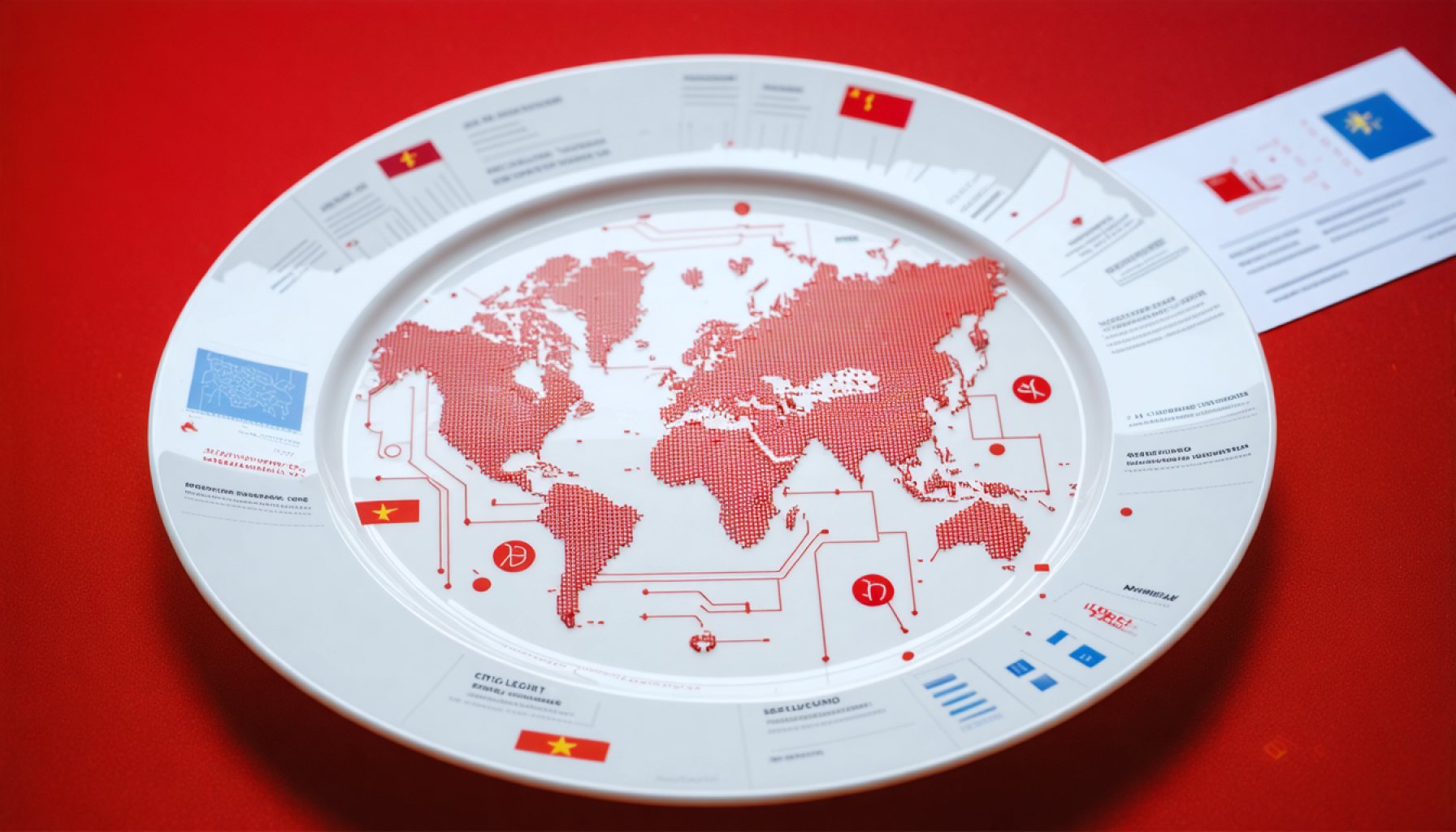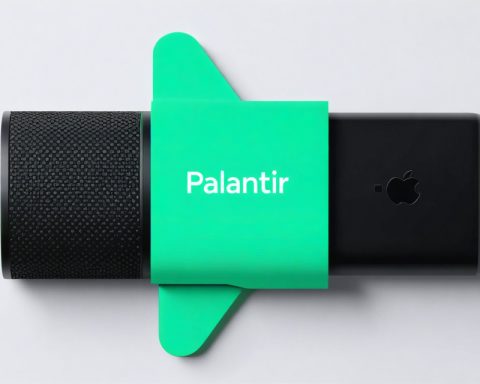- High-stakes diplomacy and dinners can significantly influence international strategies, as seen in a recent event at Mar-a-Lago involving former President Donald Trump and NVIDIA CEO Jensen Huang.
- A key policy decision to delay U.S. export controls on NVIDIA’s H20 chip was swayed by Huang’s promise of new investments in U.S. AI data centers.
- The H20 chip is crucial for China’s AI progress, with its unmatched capabilities driving significant Chinese demand.
- The impending Biden-era AI Diffusion Rule threatens to prohibit sales of U.S.-made AI processors to China, impacting NVIDIA and the wider AI industry.
- This scenario highlights the delicate balance between protecting national interests and encouraging technological growth, with ongoing global AI leadership at stake.
- The evolving interplay of technology, geopolitics, and economics will shape the future landscape of AI innovation and international relations.
When high-stakes diplomacy meets sumptuous dinners, the results can reshape international strategies. Recent headlines have illuminated a captivating scene from Mar-a-Lago, where a dinner hosted by former President Donald Trump and attended by Jensen Huang, CEO of NVIDIA, influenced a pivotal policy decision. The U.S. was on the brink of enforcing strict export controls on NVIDIA’s H20 chip, yet a surprising reversal occurred after this discreet banquet. The decision to delay the restrictions highlights the weighty influence of informal gatherings on formal policies.
Huang, a titan in the tech industry, found himself at the epicenter of this diplomatic dance, wielding considerable influence. His pledge for new investments in domestic AI data centers in the U.S., offered as the main course at this metaphorical feast, turned the tide. What had been a steadfast trajectory toward halted exports was suddenly rerouted, sparking intrigue and a reevaluation of the dynamics between technology and geopolitics.
At the heart of this power play is the H20 chip, a technological marvel integral to China’s AI ambitions. The chip’s strategic significance is immense, providing the muscle for advanced models like DeepSeek, which showcases AI’s dizzying capabilities. Despite the U.S.’s efforts to curtail its performance for export, the chip remains unmatched by domestic alternatives in China, leading to a multi-billion dollar stockpile earlier this year by eager Chinese corporations.
Yet, the specter of the Biden-era AI Diffusion Rule looms large, threatening to dash NVIDIA’s relief. Set to be effectively stern and unwavering, this forthcoming rule intends to prohibit the sale of all U.S.-crafted AI processors to China, closing loopholes that performance tweaks could exploit. With the rule’s implementation imminent, NVIDIA, along with the broader AI ecosystem, stands on a precipice. The decision matrix facing the U.S. involves walking a fine line between safeguarding national interests and fostering industry growth.
The entwined tale of NVIDIA’s chip embodies the intricate geopolitics influencing technical innovation and international alliances. As these stories unfold, the course of global AI leadership remains uncertain. The decisions by political figureheads and corporate executives today will dictate the technological and economic landscapes of tomorrow. In this game of advanced tech and international power struggles, the strategic playbook is still being written, and its pages are ripe with both opportunity and risk.
NVIDIA’s High-Stakes Diplomacy: How a Dinner Changed Global Tech Policies
Introduction
The confluence of technology, diplomacy, and geopolitics has never been more apparent than in the recent interactions between NVIDIA and the U.S. government. At the heart of this narrative lies a pivotal dinner hosted by former President Donald Trump at Mar-a-Lago, changing the fate of NVIDIA’s H20 chip exports to China. This article delves into the layers of strategy and influence at play, examining how informal exchanges can redefine formal policy directions.
How Informal Gatherings Shape Formal Policies
Informal diplomatic settings, such as dinners, have historically played crucial roles in shaping policy directions. In this case, Jensen Huang, CEO of NVIDIA, leveraged this platform to influence decisions crucial for his company. By promising investments in domestic AI infrastructure—specifically in AI data centers—Huang effectively shifted the trajectory away from restricting NVIDIA’s H20 chip exports.
The Strategic Significance of the H20 Chip
The H20 chip is more than a technological marvel—it’s a cornerstone of China’s AI development plans. Powering advanced models like DeepSeek, this chip is unparalleled by any Chinese domestic alternative. According to industry reports, Chinese corporations have aggressively stockpiled NVIDIA’s chips, anticipating future restrictions. This highlights the importance of the H20 in maintaining China’s AI competitiveness.
The Upcoming AI Diffusion Rule
The Biden administration’s AI Diffusion Rule could soon present another barrier for U.S. companies like NVIDIA. Aiming to prevent performance workarounds, this rule might prohibit the export of all U.S.-manufactured AI processors to China. The implications for NVIDIA and similar entities are vast, posing potential disruptions to their access to international markets and innovation Exchange.
How-To Steps & Life Hacks: Navigating Export Controls
1. Stay Informed on Policy Changes: Regularly review updates from the U.S. Department of Commerce and international trade bodies.
2. Enhance Domestic Investments: Focus on building and upgrading domestic manufacturing capabilities to mitigate international trade risks.
3. Diversify Market Focus: Consider expanding into regions with less stringent export controls to offset potential losses from restricted markets.
Real-World Use Case and Industry Trends
The situation highlights the increasing interdependence between technology policy and international relations. Companies need to adapt by integrating geopolitical risk assessments into strategic planning. The current environment suggests a trend towards more regionalized technology ecosystems, influenced by national security concerns.
Controversies & Limitations
A significant controversy is whether such diplomatic interludes undermine formal policy processes. Critics argue that these backchannel negotiations lack transparency and might prioritize corporate interests over national security. Furthermore, the limitations of alternative non-U.S. AI hardware could slow down global AI advancements if exports are restricted.
Insights & Predictions
The future landscape of global AI leadership will likely be shaped by these diplomatic interactions and policy adaptations. As countries grapple with balancing technological prowess and security concerns, expect more complex and regionally-focused AI development strategies.
Actionable Recommendations
– For Tech Executives: Engage in diplomatic dialogues and emphasize the broader economic benefits of tech collaboration.
– For Policymakers: Develop balanced policies that secure national interests while fostering innovation.
– For Investors: Monitor geopolitical developments closely as they could significantly impact market dynamics.
Quick Tips
1. Build Alliances: Collaborate with international partners to enhance resilience against restrictive policies.
2. Lead Innovation: Invest in R&D for breakthrough technologies that could bypass current geopolitical tensions.
3. Focus on Compliance: Design products that inherently comply with varying international regulations to ensure smoother cross-border transactions.
Conclusion
As the saga of NVIDIA’s H20 chip unfolds, it underscores the complexities of the modern geopolitical landscape impacting technology enterprises. Companies and countries alike must navigate this environment cautiously, balancing the prospects of innovation and the prerogatives of national security.
For more insights on global technology dynamics, visit the official [NVIDIA](https://www.nvidia.com) website or explore updates from the U.S. [Department of Commerce](https://www.commerce.gov).








